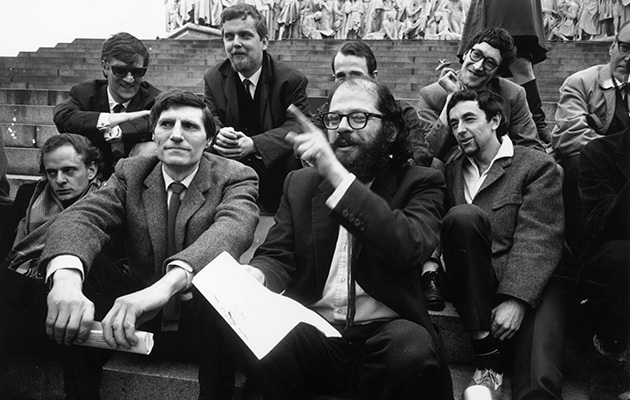John ‘Hoppy’ Hopkins, a friend of the organisers with Fleet Street contacts, was asked to take publicity photographs. Hoppy had been drawn into poetry through his love of music. “Music was the golden thread that ran through everything,” he says. “Mike Horovitz worked at the juncture between jazz and poetry and through him I discovered Ginsberg and Ferlinghetti.” Horovitz regularly performed at Ronnie’s Scott’s and Peter Cook’s Establishment Club, accompanied by Dudley Moore and Stan Tracey. “The input of musicians, especially jazz musicians, was central,” agrees Horovitz. “All beat poets tried to write like Charlie Parker played.”
Two days before the event, Whitehead was asked to film the reading. “I got hold of a silent camera so I could film without anybody knowing I was there,” he says. “I had four reels, which gave me 44 minutes of footage. The finished film [Wholly Communion] is 33 minutes, which is a good ratio for an event where nobody knows what is going to happen.”
Nobody even had any idea how many people would turn up. “I don’t think we knew it was going to be a success until we got there and saw people queuing round the block,” says Hoppy. “We were saying, ‘Wow, there’s that many of us’.” Whitehead says, “People started pouring in. Before long we heard the place was full and 2,000 people turned away. We started to get very excited. It was happening.”
Richter had prepared the hall. “There had been a boxing match the night before and we told them to leave the ring but take down the ropes,” says Richter. “We got old lamps, and sofas for the poets to sit on, and stuck a lectern in the middle. We went to Covent Garden to get old flowers and handed them out as people came in. On the programme, we said: ‘Smoking is permitted’ so you can imagine the scent that filled the hall.”
The reading lasted more than four hours. “Pretty much everybody could read if they could fight, cajole or bribe their way to the lectern,’ says Richter. “You were in the middle, the audience was 360 degrees around you. Every word went ringing out and you could feel the vibrations coming back – it was one of the high points of my life, the energy, the immediacy. You knew something had happened.”
Most of the highlights are captured on Wholly Communion. One is Mitchell’s venomous reading of his anti-war poem Telling Lies About Vietnam. This was one of the first public anti-Vietnam War statements and got a standing ovation.
“The ‘60s wasn’t peace, love and understanding,” says Whitehead. “It was bomb culture. We were at war with America and America was at war with Vietnam. Adrian Mitchell’s poem wasn’t unexpected but it was so powerful, crazy and mad, a perfect public poem. I think it was the first poem of its kind, certainly the first read in front of more than 50 people. Adrian banged you straight in the face with the first word.”
More light-hearted was Horovitz, Ernst Jandl and Pete Brown’s choreographed rendition of Kurt Schwitter’s ‘Sneeze’, a series of sounds that became a giant orgasmic sneeze. “Jandl’s sneezing poem was a total riot,” says Whitehead. “7,000 people howling with mirth and clapping just because it was so crazy.”
Equally memorable was Harry Fainlight’s breakdown while reading ‘The Spider’, about a bad trip. “His poem was dark and long and people were getting restive because everything else had been entertaining,” says Horovitz. “Simon Vinkenoog, a blithe blonde angelic lad, started shouting ‘Love! Love! Love!’, and waving his arm like a bird. Harry stopped and people started shouting all sorts of things and Ginsberg was yelling ‘Read the text, read the text,’ and throwing flowers everywhere and it became a mad bear garden.”
Hoppy: “One version is that Harry was getting some flak and Vinkenoog, this Dutch acid poet, stood up and shouted ‘Love! Love!’ and Harry heard it as ‘Leave, Leave’ in some sort of paranoid switchover. It was too much for him.”
Watching from the stalls was Heathcote Williams: ‘The crowd became impatient and shouted, ‘OFF! OFF!’ over and again; treating him like a bore at a party. When I learned of Fainlight’s death in a cold, bleak cottage in Wales, possibly of starvation, I thought of the anguish of that moment and that merciless crowd it wasn’t quite the node of peace and love and understanding that it’s since been cracked up to be.”
Ginsberg was also unhappy with the treatment dished out to Fainlight, and this may have been why he got so drunk. He later expressed dissatisfaction with the reading, including his own performance. “There was some very good poetry, but there was a lot of it. Allen was always very critical, he took it very seriously,” says Richter. “He was one of the great poets of the 20th century and his reputation and the quality of poetry was very important to him.”
Hoppy concurs: “He got drunk and thought he hadn’t delivered his poems well even though he had, but looking down through the pinball machine of history that really didn’t matter.”



